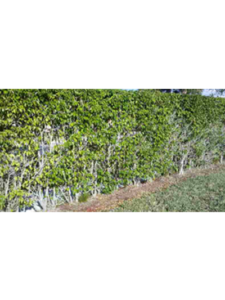WHITEFLIES – DESTROYING FLORIDA’S
FICUS TREES AND HEDGES
 Q. What are whiteflies?
Q. What are whiteflies?
A. Not true flies; whiteflies are actually members of the same insect family that contains aphids, scale insects, leafhoppers and mealy bugs. They derive their name from the white, waxy substance they secrete.
Q. What do they look like?
A. Whiteflies are usually about 1/16 of an inch long. They have a pierce-sucking mouthpart located at the back of their head. Like other members of the Homoptera family, they have four transparent wings with visible veins. On a whitefly, these wings appear opaque due to the white waxy scales that give the whitefly its color. These wings create a roof-like covering over the insect when not in flight.

A. Whiteflies cause serious injury to plants by sucking juices from them, resulting in wilting, stunting and even death. Florida Ficus tress and hedges are frequent victims of whitefly infestation. The white, sticky substance called honeydew that is secreted by whiteflies can coat virtually any object, including fruit, leaves, walkways, windows and windshields and anywhere it should fall. Molds grow on this honeydew, creating a black, sticky mess. These molds make fruit unmarketable. It also blocks sunlight from reaching leaf surfaces, thus reducing the natural occurrence of photosynthesis. Whitefly adults transmit various viruses from plant to plant, damaging not only commercial agriculture but also backyard gardens and landscaping.

Healthy Ficus Hedge |

Recovering Ficus Hedge |






